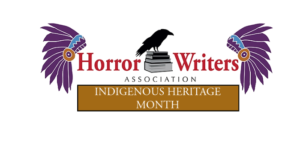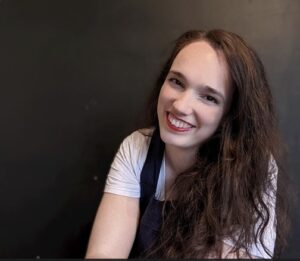Indigenous Heritage in Horror Month: Interview with Mathilda Zeller

Mathilda Zeller is a horror and fantasy writer of Inuit descent. She has inhabited 2 continents, 3 countries, 11 of the United States, and 18 towns. Don’t ask her where she’s from; it’s complicated. She endeavors to make you lose sleep with her stories and currently makes her home in the Midwest with her husband, six children, and two cats.

What inspired you to start writing?
I’ve never had a specific catalyst moment when I wanted to be a writer. I’ve been writing stories for as long as I’ve known how to write, and I’ve always wanted a career as a writer. There have been a thousand stories and authors who have made me even hungrier to be a part of this world, and it’s tremendously exciting to have found a little bit of a footing in it.
What was it about the horror genre that drew you to it?
It’s fun to be scared. It’s cathartic to lift your head and look at the thing you don’t want to see but must see. Whether or not it’s a “happy” ending, engaging with the Dark Thing in horror somehow puts the Dark Things in our real lives into perspective. If you can name it, you can tame it.
Do you make a conscious effort to include indigenous characters and themes in your writing and if so, what do you want to portray?
I’m not sure I’ve deliberately made a conscious effort to include indigenous characters in my writing; they’re an organic part of my life and family and self so of course they’ll be an organic part of what I write. I want to portray people, as real and transcendent and flawed as the ones in my actual life.
What has writing horror taught you about the world and yourself?
Writing horror has taught me that even in the face of inescapable cosmic horror, we are still us. Our selfhood is more inescapable than any external circumstances, and even when we feel helpless, our choices still matter.
How have you seen the horror genre change over the years? And how do you think it will continue to evolve?
Horror has shifted to feature more marginalized voices and perspectives, which is a thing I deeply appreciate. Jordan Peele’s work has been incredible, not only in the caliber of what he’s creating but also in the perspectives and narratives he’s bringing to the table. Stephen Graham Jones, Rebecca Roanhorse, Tommy Orange, Silvia Moreno Garcia, and so many others are trailblazers and groundbreakers, and it has been incredible to fall in love with their work and to see them do so well. As new horror becomes more diverse, it becomes more interesting, and I am really excited to see what comes next.
How do you feel the indigenous community has been represented thus far in the genre and what hopes do you have for representation in the genre going forward?
The unfortunate trope is, of course, that indigenous people are a mystical, magical, ancient, and perhaps evil monolith. “Ancient Indian Curse,” “Cursed Indian Burial Grounds,” the shaman, the medicine man–these things tend to relegate indigenous people to the role of monster, otherworldly creature, force of nature or cosmic mystery rather than actual people.
What I love about Never Whistle at Night and other stories coming out is the centering of indigenous perspectives and humanity. We’re not magical, or “extinct” or primitive. We’re here, and human, and our stories and history and heritage are so full of horror that we don’t have to invent monsters. Our real lives and histories have been shaped by them.
Who are some indigenous horror authors you recommend our audience check out?
I would absolutely recommend all my co-contributors in the Never Whistle at Night anthology. I am still so awestruck and honored to be a part of this project with them. However, I want to give a particular recommendation to Shane Hawk, whose anthology Anoka is as remarkable as it is haunting; Rebecca Roanhorse, who absolutely floored me with the clean brutality of “White Hills;” and Nick Medina, whose story “Quantum” articulated what thousands of words on blood quantum discourse could not.
What is one piece of advice you would give horror authors today?
Write. Don’t stop writing, don’t stop reading, and don’t be afraid to submit your work, again and again and again. The worst they can say is no. You have nothing to lose, and everything to gain.
And to the Indigenous writers out there who are just getting started, what advice would you give them?
Your voice matters. Your experiences matter. You have stories and perspectives that need to be out in the world. You don’t look like Stephen King and your work is not his, but maybe that’s a good thing. Keep going. We’ll rise together.



